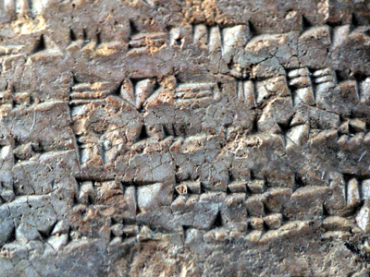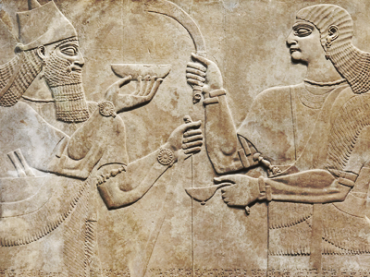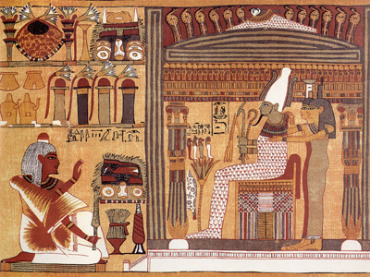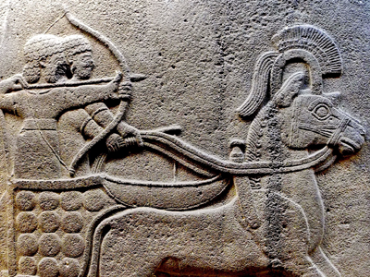Ancient Near East
The ancient Near East refers to early civilizations in a region roughly corresponding to the modern Middle East: Mesopotamia (modern Iraq and Syria), Anatolia (modern Turkey), the Levant (modern Syria, Lebanon, Israel, Palestine, and Jordan), as well as Persia (modern Iran), and Ancient Egypt, from the beginnings of Sumer in the 6th millennium BCE until the region's conquest by Alexander the Great in the 4th century BCE.
The Religions of Modern Syria and Palestine
Series: Syriac Studies Library 219
ISBN: 978-1-61143-604-4
This volume represents the Bross Lectures given by Frederick J. Bliss in 1908 in which he describes the religious practices of Christians and Muslims in Syria and Palestine.
$175.00
The Semitic Alphabets
By Isaac Taylor
Series: Kiraz Historical Grammars Archive 36
ISBN: 978-1-61143-681-5
Isaac Taylor (1829-1901) is best known for his archaeological and philological works, especially his detailed study of the alphabets published in 1883. This book on the Semitic alphabets comprises the first volume of Taylor’s 1883 study. Taylor begins with a discussion on the invention of writing and the origin of the alphabet, then gives a discussion of three alphabetic families, what he calls the Phoenician alphabet, the Aramean alphabets (covering Palmyra, Hebrew, Syriac, Mongolian, and Arabic), and the south Semitic alphabets (covering Sabean and Ethiopic).
$176.00
Festgruss an Rudolf von Roth
zum Doktor-Jubiläum 24 August 1893
ISBN: 978-1-61143-686-0
Rudolf von Roth (1821-1895) was a prominent German philologist. In this Festgruss, forty four of his colleagues and students presented him papers on various topics on the occasion of his Doctor-Jubiläum. They included luminaries like Theodor Nöldeke, William D. Whitney, Edward V. Arnold, and others. The topics discussed are mostly philological covering a wide range of eastern languages, both Semitic and Indic.
$140.00
Raumdimensionen im Altertum
Edited by Maria Kristina Lahn & Maren-Grischa Schröter
Series: MOSAIK<i>journal</i> 1
ISBN: 978-1-61143-955-7
MOSAIKjournal was established in 2009 as an interdisciplinary e-journal primarily specializing in research on antiquity. Each volume is dedicated to a special topic of current academic interest. The aim of this new journal is to give scholars a joint forum of discussion and to synthesize results of different disciplines.
$153.00
Iconea 2009-2010
Proceedings of the International Conference of Near Eastern Archaeomusicology. Université de la Sorbonne Paris IV November 25, 26 and 27, 2009 and at the University of London, Senate House December 13, 14 and 15, 2010
Edited by Richard Dumbrill & Irving Finkel
Series: Iconea 1
ISBN: 978-1-4632-0182-1
ICONEA is the only publication exclusively dedicated to the archaeomusicology of Near and Middle Eastern cultures from its Sumerian origins to the dawn of Christianity. ICONEA also publishes papers of comparative archaeomusicology with contemporaneous neighbouring cultures.
$94.00
Idiophones of the Ancient Near East
In the Collections of the British Museum
ISBN: 978-1-61143-956-4
This book is a catalogue of the idiophones acquired by the Department of the Near East of the British Museum since the mid-nineteenth century. It includes clay rattles principally from Ur, dating from the third millennium BC; shell clappers; copper and bronze clappers and cymbals from Nimrud and from other prestigious locations and a remarkable collection of bronze bells mainly from Nimrud, unearthed by Layard around 1850. The book gives an accurate description of the objects along with former references and a comprehensive bibliography.
$119.00
Facing an Empire
Hirbemerdon Tepe and the Upper Tigris Region during the Early Iron Age and Neo-Assyrian Period
Series: Gorgias Studies in the Ancient Near East 1
ISBN: 978-1-4632-0146-3
Recent archaeological discoveries within the Upper Tigris region in Southeastern Turkey offer a unique opportunity to understand the dynamics of the Assyrian Empire borderlands. Within a few years most of the region will be irreversibly submerged, due to the construction of the Ilisu dam, the biggest hydroelectric power plant project in Turkey. It is of paramount importance to understand and record as much data as possible about the local communities and the foreign connections that flowered in this area.
$138.00
Kubaba 1 (2010)
Journal of Ancient Southwest Asia and Eastern Mediterranean Studies
Series: Kubaba 1
ISBN: 978-1-4632-0144-9
Kubaba is a peer-reviewed journal which specializes in the geographical region of Southwest Asia, the Eastern Mediterranean, and the Aegean before the Classical Era. It publishes articles, notes, news and reviews.
$52.00
Journal for Late Antique Religion and Culture
ISBN: 978-1-4632-0052-7
The Journal for Late Antique Religion and Culture (JLARC) is a peer-reviewed open access online journal edited by members of the Cardiff Centre for Late Antique Religion and Culture (CLARC) and published by Cardiff University (http://www.cardiff.ac.uk/clarc).
$50.00
Persian Period Jerusalem and Yehud
A Rejoinder
Series: Analecta Gorgiana 1078
ISBN: 978-1-4632-0125-8
The author responds to criticism against his prior publications, when his conclusions were based foremost on the relevant archaeological findings. It is a debate between methodologies used by archaeology and the assumptions of textual analysis within biblical scholarship.
$33.00
Priestly Power that Empowers
Michel Foucault, Middle-Tier Levites, and the Sociology of ‘Popular Religious Groups’ in Israel
Series: Analecta Gorgiana 1084
ISBN: 978-1-4632-0131-9
Christian analyzes priestly social dynamics in-depth as they develop through tribal history and specialization of tasks. He focuses on middle-tier Levites as their skills and specialized knowledge place them in upper classes but their work relegates them as intermediaries.
$51.00
Covenant and Grace in the Old Testament
Assyrian Propaganda and Israelite Faith
ISBN: 978-1-60724-015-0
This book examines the Old Testament language about Israel’s relationship with God in the light of Assyrian royal propaganda. Unpacking this language’s meaning in both Assyrian and biblical contexts, it shows Israel borrowed language from Assyrian vassal treaties to describe its covenant with God, and this book reveals what “covenant” meant, and that it is not “covenant” at all, but “grace.” The broader theological implications of this discovery are explored in dialogue with contemporary theologians. The book takes seriously the study of text in its ancient context in order to highlight the theological content and its modern relevance.
$166.00
Journal for Late Antique Religion and Culture
ISBN: 978-1-4632-0147-0
The Journal for Late Antique Religion and Culture (JLARC) is a peer-reviewed free-access online journal edited by members of the Cardiff Centre for Late Antique Religion and Culture (CLARC) and published by Cardiff University (http://www.cardiff.ac.uk/clarc).
$42.00
Journal for Late Antique Religion and Culture
ISBN: 978-1-4632-0148-7
The Journal for Late Antique Religion and Culture (JLARC) is a peer-reviewed free-access online journal edited by members of the Cardiff Centre for Late Antique Religion and Culture (CLARC) and published by Cardiff University (http://www.cardiff.ac.uk/clarc).
$49.00
Journal for Late Antique Religion and Culture
ISBN: 978-1-4632-0149-4
The Journal for Late Antique Religion and Culture (JLARC) is a peer-reviewed free-access online journal edited by members of the Cardiff Centre for Late Antique Religion and Culture (CLARC) and published by Cardiff University (http://www.cardiff.ac.uk/clarc).
$57.00
Keter Shem Tov
Essays on the Dead Sea Scrolls in Memory of Alan Crown
Edited by Shani Tzoref & Ian Young
ISBN: 978-1-61143-866-6
This eclectic collection contains 16 articles on a variety of topics within Qumran Studies from a conference held in memory of the late Professor Alan Crown. Essays cover the impact of the Qumran discoveries on the study of the Hebrew Bible and the New Testament to the study of the scrolls themselves and the community organizations presupposed in them, focusing as well on topics as diverse as sexuality, scribal practice and the attitude to the Temple in the scrolls.
$184.00
Seeing the God
Ways of Envisioning the Divine in Ancient Mediterranean Religion
Edited by Jeffrey B. Pettis
ISBN: 978-1-61143-251-0
"When people prayed, they expected their gods to come," wrote Robin Lane Fox, providing the impetus for this volume of collected essays exploring the concept of how the ancients “envisioned” the deities within various ancient religious traditions. The perspectives of Judaism, Gnosticism, Syriac Christianity, Byzantium, and Classical Greco-Roman religion and philosophy are considered. Specific emphasis is given to phenomena such as dreams, visions, and initiatory rites mediating the divine encounter.
$143.00
Perspectives on Hebrew Scriptures VII
Comprising the Contents of Journal of Hebrew Scriptures, Vol. 10
Edited by Ehud Ben Zvi
ISBN: 978-1-4632-0165-4
This volume incorporates all the articles and reviews published in Volume 10 (2010) of the Journal of Hebrew Scriptures.
$298.00
Kubaba 2 (2011)
Journal of Ancient Southwest Asia and Eastern Mediterranean Studies
Series: Kubaba 2
ISBN: 978-1-60724-679-4
Kubaba is a peer-reviewed journal which specializes in the geographical region of Southwest Asia, the Eastern Mediterranean, and the Aegean before the Classical Era. It publishes articles, notes, news and reviews.
$60.00
The Tell en-Nasbeh Excavations after 85 Years
Edited by Jeffrey R. Zorn & Aaron J. Brody
Series: Gorgias Studies in the Ancient Near East 9
ISBN: 978-1-4632-0416-7
Collected essays on aspects of daily life at the Israelite site of Tell en-Nasbeh (biblical Mizpah of Benjamin). These include: trade and economy, death and burial, metals, cooking, water management, curation of the site’s materials, and a site bibliography.
$164.00
From Ugarit to Nabataea
Studies in Honor of John F. Healey
Edited by George Anton Kiraz & Zeyad Al-Salameen
Series: Gorgias Ugaritic Studies 6
ISBN: 978-1-4632-0180-7
From Ugarit to Nabataea is a collection of articles on the texts and cultures of various Near and Middle Eastern societies such as Ugarit, Ancient North Arabia, Nabatea, Palmyra, Edessa, the monasteries of Mesopotamia, and modern day Syriac-speaking communities. They include discussion of the religious beliefs, iconography, epigraphy, architecture and language of these societies – fields to which John F. Healey has contributed in his long, distinguished and varied career.
$160.00
Narratology and the Pentateuch Targums
A Methodological Experiment
By Simon Lasair
Series: Biblical Intersections 9
ISBN: 978-1-61143-489-7
In this innovative book Simon Lasair explores some of the potentials of applying narratology to the Pentateuch Targums. Lasair argues that when the targums present coherent narratives, they largely carry the major structures of the Pentateuch over into an Aramaic context. This book calls for a wide ranging rethink of the methodologies used to study targumic literature, as well as how to place the targums within their original historical contexts.
$138.00
Portraits of a King Favored by God
David the King: God's Poet, Warrior, and Statesman
Edited by Mishael M. Caspi & John T. Greene
Series: Biblical Intersections 8
ISBN: 978-1-61143-405-7
David the king, when studied against the backdrop of existing material cultural remains from the ancient Middle East, scarcely seems to have been there. Excavations in Jerusalem have turned up nothing concrete about his existence. The literature concerning him is fraught with problems and generally takes on a legendary-mythological character. Even the meaning of his name is unclear. If he is mentioned at all by his contemporary monarchs against whom he would have fought it is only obliquely or only intimated by omissions or partial spellings in context. This volume attempts to advance scholarship addressing these concerns.
$150.00
Job of Uz
Suffering of the Righteous and the Justice of God
Edited by Mishael M. Caspi & John T. Greene
Series: Biblical Intersections 7
ISBN: 978-1-61143-420-0
Job finds himself in a situation similar to one experienced by everyone at some point in his or her life. He wants answers to questions concerning what has happened to him, since he lived his life according to the traditional wisdom and rules of conduct, asking what has gone wrong and why. The Book of Job raises fundamental questions of both the actions and expectations of humans and deities, and asks whether a clear understanding can be reached between them. The contributing essays to this anthology help advance and sharpen both the questions and the responses to that question.
$140.00
Untersuchungen über die Geschichte des Königreichs Osroëne
Series: Syriac Studies Library 3
ISBN: 978-1-61719-417-7
This volume is a good quality reprint of the 1887 edition of Alfred von Gutschmid's classic text. It will be of interest to scholars in the Syriac-speaking kingdom of Osroene (or Edessa).
$141.00
Filter by
Filter by price
Filter by manufacturer





























